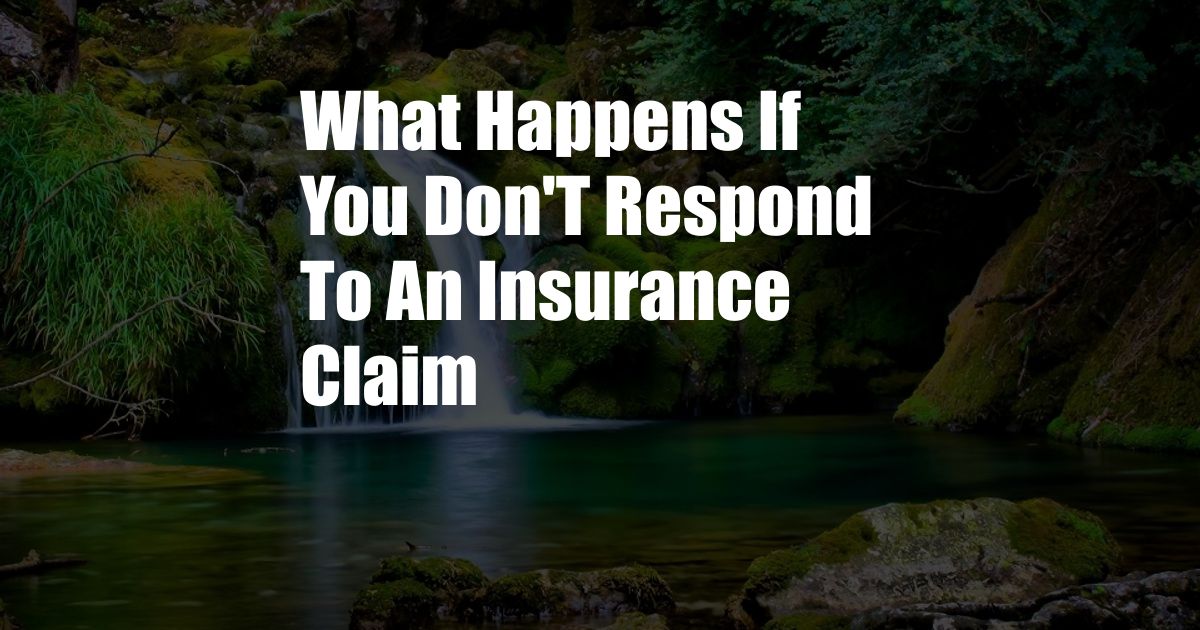
What Happens If You Don’t Respond to an Insurance Claim?
Insurance policies are designed to protect you financially in the event of an accident or other unexpected event. However, if you don’t respond to an insurance claim, you may be putting your coverage at risk. In this article, we’ll discuss what happens if you don’t respond to an insurance claim and provide tips for handling claims in a timely manner.
Understanding the Insurance Claims Process
When you file an insurance claim, you are essentially asking your insurance company to pay for damages or losses that you have incurred. The claims process typically involves the following steps:
- You file a claim with your insurance company.
- The insurance company investigates your claim.
- The insurance company makes a decision on your claim.
- You receive payment for your claim.
If you don’t respond to an insurance claim, the insurance company may assume that you are not interested in pursuing the claim. This can lead to the claim being denied or delayed.
Consequences of Not Responding to an Insurance Claim
There are several potential consequences of not responding to an insurance claim, including:
- Delayed payment: If you don’t respond to an insurance claim, the insurance company may delay payment on your claim. This can cause financial hardship, especially if you are relying on the insurance money to cover expenses.
- Denied claim: If you don’t respond to an insurance claim, the insurance company may deny your claim. This means that you will not receive any money from the insurance company for your damages or losses.
- Loss of coverage: If you don’t respond to an insurance claim, the insurance company may cancel your coverage. This means that you will no longer be protected by the insurance policy.
Tips for Handling Insurance Claims
To avoid the negative consequences of not responding to an insurance claim, it is important to handle claims in a timely manner. Here are some tips for handling insurance claims:
- Respond promptly: When you receive a letter or email from your insurance company about a claim, respond promptly. This will show the insurance company that you are interested in pursuing the claim.
- Cooperate with the investigation: The insurance company will need to investigate your claim to determine whether you are eligible for benefits. Cooperate with the investigation by providing the necessary documentation and information.
- Negotiate a settlement: If the insurance company offers you a settlement, don’t be afraid to negotiate. You may be able to get a higher settlement if you are willing to compromise.
- Follow up: If you don’t hear back from the insurance company after you have filed a claim, follow up. This will help to keep your claim moving forward.
Conclusion
If you don’t respond to an insurance claim, you may be putting your coverage at risk. By following the tips above, you can ensure that your claims are handled in a timely and efficient manner.
Are you interested in learning more about insurance claims? If so, please leave a comment below.
FAQs
- What should I do if I don’t receive a response from my insurance company?
- How long do I have to respond to an insurance claim?
- What should I do if my insurance claim is denied?
Answers
- If you don’t receive a response from your insurance company, you should follow up. You can call the insurance company or send an email.
- You typically have 30 days to respond to an insurance claim. However, this may vary depending on the insurance company and the type of claim.
- If your insurance claim is denied, you can appeal the decision. You will need to submit a written appeal to the insurance company.